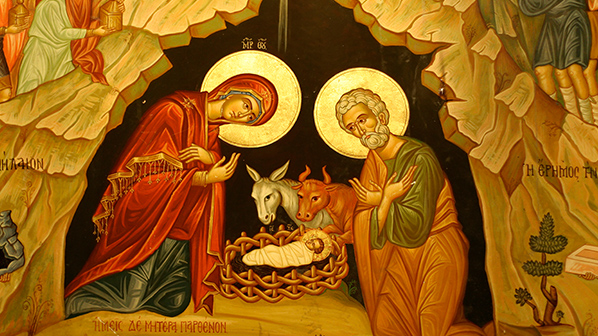Merry Christmas!!!
The Church thinks this is such a special feast that one day is not sufficient. Christmas is not a day, Christmas has an “octave”. An octave has a unique meaning in music and math. Pythagoras, the ancient Greek mathematician, discovered that notes that sound good together (i.e. are in harmony) are mathematically related. He also found that the sound of a note plucked on a string depends on its length and tension. In his experiments, he discovered that by halving the length of a string and plucking it again, you produce a sound that it is almost the same. However, this sound is higher in pitch. The interval between the original note and the note produced by halving the string is referred to as an octave. Mathematically, an octave is the distance between any given note with a set frequency, and another note with double that frequency. In music, both these notes have the same name but are written an octave apart on the staff.
Liturgically, an octave is simply the eight days during which major feasts are celebrated. The “eighth day” was originally associated with the weekly Christian celebration of the resurrection of Christ every “eighth day”, which became a name for Sunday. The number eight became symbolic of new life. Since circumcisions were performed on the “eighth day” after birth, the number 8 became associated also with baptism, and baptismal fonts have from an early date often been octagonal.
The development of liturgical octaves occurred slowly. Little by little people began to understand that you could never celebrate something like Christmas or Easter in one 24-hour period. A feast requires much more time to just get going and much more time to slow it down once the celebration has begun. At one point in the Church’s history, all major saints and locales had their own octaves. However, in 1955, Pope Pius XII reduced the number of octaves to two – Christmas and Easter. He wanted to make sure we were not missing the important festivities by having parties all year round.
Liturgically, during the Christmas Octave, the Church walks us through the Gospel’s infancy narrative. The Church is encouraging us to wake up to the presence of the Divine all around us. This is encouragement to take these mysteries to prayer, to greater reflect on this Child and the wonders of Jesus’ birth, and to personally and intimately come to a fuller understanding of who Jesus is. Not just for the Church, but to each one of us specifically.
If I could return to what Pythagoras taught 500 years before Christ about octaves; notes in harmony. Perhaps one of the things we could do during this Christmas Octave is to have our life lived in greater harmony with the way of Jesus, to make a beautiful sound together.
On Christmas Day, the Church gave us the beginning of John for our Gospel. “…and this life was the light of the human race; and the light shines in the darkness, and the darkness has not overcome it…”. May that same light today pour God’s radiant aliveness into your life so that you might become a portal of light for our world. Jesus’ birth signals the start of a new day, a new way, a new understanding of what it means to live. As you live in harmony with that divine light, may you be able to see the presence of God’s grace in your home, your workplace, your neighborhood and all whom you encounter. Let Christmas light dawn on you.
Peace,
Fr. Damian



